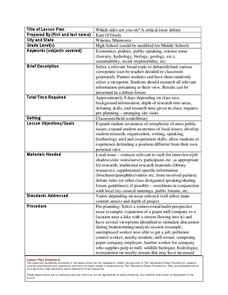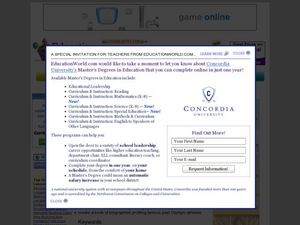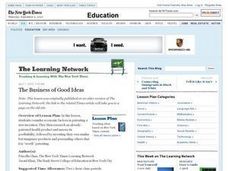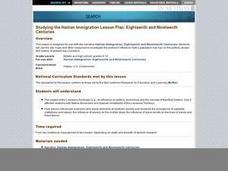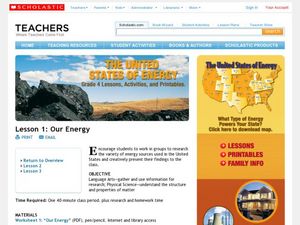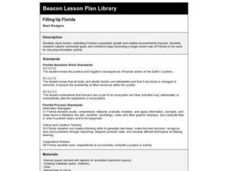Curated OER
Oceans of the World
Students compare and contrast information about oceans. They locate the oceans on a globe, and in small groups conduct Internet research on the oceans, identifying the similarities and differences and writing a report.
Curated OER
Ice Age Animals
Students research the ice age and the animals that were on the Earth at that time and have a debate on the explanation for the extinction of the ice age animals.
Curated OER
Changing Circumstances, Changing U.S. Foreign Policy
Students examine how relationships between countries change overtime. They identify the factors that play a role in altering the relationships and contribute to U.S. foreign policy toward their country of research. Groups conduct their...
Curated OER
Lesson: The U.S. Westward Movement
Learners research the U.S. Westward movement. In this U.S. history lesson, students research the topic, complete a creative writing activity for the lesson, and a design activity for the lesson.
Curated OER
Chinese Immigrants in British Columbia, 1870
Students interpret historical evidence presented in primary and secondary resources. In this British Columbia history lesson, students read and analyze data regarding 1870 Canadian census data. Students...
Curated OER
Which Sides Are You on? A critical Issue Debate
Students study public issues and become more aware of local issues. For this economics lesson students are given some local controversial issues and several viewpoints to analyze. They then research and review the topic with the class.
Curated OER
The U.S. Westward Movement
Students, working in groups, research and write about one of the trails that were used during US Westward Movement. They create a travel brochure for their trail keeping in mind the era in which the travel took place.
Curated OER
Organizaton of American States Project
High schoolers discover the Organization of American States by researching currents issues in those countries. They create a PowerPoint presentation and share with the class.
Curated OER
European Explorers in France, England, Portugal, and Spain
Students, in groups, research either France, Spain, Portugal, or England. They create a poster describing various aspects of their country and how their country participated in the exploration of America. They present their project to...
Curated OER
Hello Mexico City
Students research and explain the functions, characteristics, and cultural aspects of Mexico City and analyze how they have affected development and settlement. Students work in groups to gather information and report back to the class.
Curated OER
Inventors - A Multimedia Presentation
Learners research inventors. In this research project, students select an inventor and research their accomplishments. Then, learners create a PowerPoint presentation to help share what they have learned.
Curated OER
Olympic Biographies
Students create a book of biographies in order to profile famous Olympic athletes through history. In this biography writing lesson, students research information about historic Olympians, first by listening to a short biography on Jesse...
Curated OER
Baseball, Race and Ethnicity: Rounding the Bases
Students consider Race and Ethnicity in baseball. In this American history lesson, students examine primary source images of American baseball. They then develop an original argument, pose historical questions and conduct Internet research.
Curated OER
Science Under Control
Pupils investigate and assess scientific issues for which government regulation has been or might be enacted. Using their research, students write letters to lawmakers supporting or contesting related legislative efforts.
Curated OER
Playing By Different Rules
Students explore the concept of American imperialism by researching and analyzing historical examples of American imperialism. They draft a set of laws that would govern the actions of powerful nations in other countries.
Curated OER
Ambivalent Council
Students consider the purpose of a constitution and research Iraq's five major population groups. They write a letter to the Iraqi Governing Council from the perspective of a member of one of these Iraqi population groups.
Curated OER
the Business of Good Ideas
Students consider economic factors in patenting a new invention. They research an already-patented health product and assess its profitability.
Curated OER
You Don't Know What You've Got Until It's Found
Students consider what can be learned through the study of artifacts, focusing on those of ancient Egypt. They research famous ancient Egyptian sites to prepare for the development of proposals for exhibits in a fictional museum.
Curated OER
Studying the Haitian Immigration: 18th and 19th centuries
Students read a narrative and conduct extensive research to determine how Haiti's population has had an influence on the social, political, and economic culture of present-day Louisiana. As a culminating activity, students write papers...
Curated OER
Watch Out
Young scholars assess a time-related scenario at a railroad station. They study about the importance of a synchronized time system at Grand Central Terminal.They research various time measurement devices and develop "How It Works"...
Curated OER
Our Energy
Fifth graders research energy sources used in the United States. In this energy sources instructional activity, 5th graders work in teams to research various energy sources. Students complete a worksheet for the research and make a short...
Curated OER
Filling Up Florida
Students study factors controlling Florida's population growth and related environmental impacts. They research natural community types and construct maps (including a large-sized map of Florida) to be used for a simulation activity.
Curated OER
Indian Removal Act
High schoolers use the Internet to research the Indian Removal Act and write a journalistic article showcasing their findings. They choose from a variety of viewpoints and topics to narrow their focus.
Curated OER
A Reef of Your Own
High schoolers research and study the life and reproductive strategies of reef building corals. They examine how coral reefs can produce high levels of biological material when they are surviving in areas of low nutrition.







